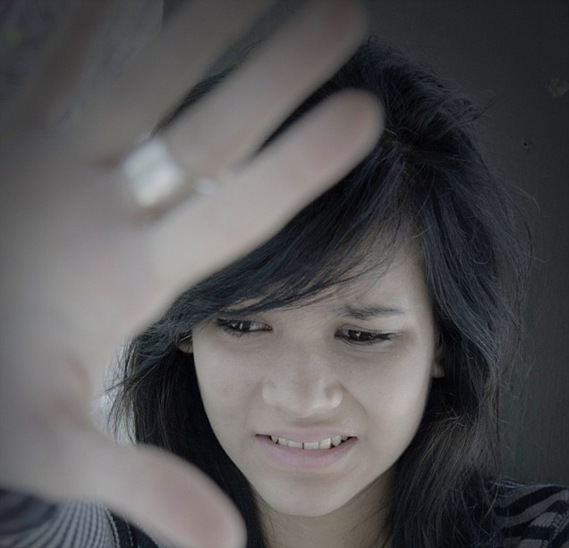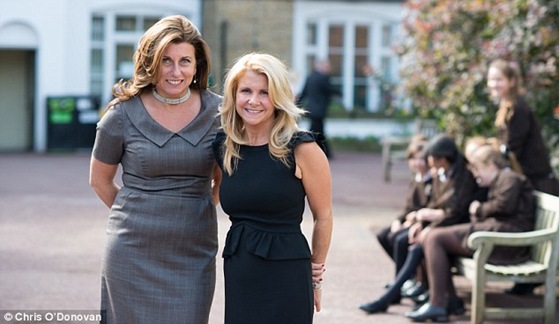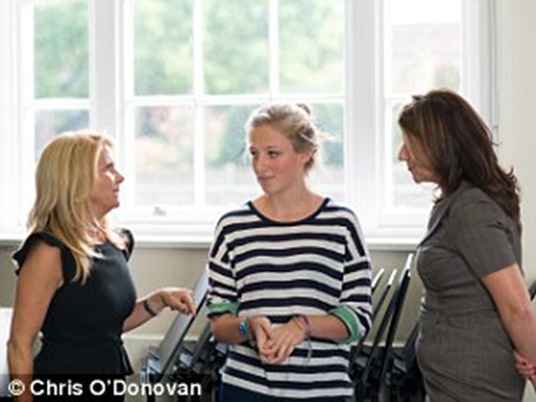Daily Mail
December 4, 2013

Sassy and glamorous in killer heels and an expensively tailored peplum dress, a petite blonde woman is addressing a hall full of teenage girls at an elite independent school. They are captivated by her streetwise New York accent, her eye-widening anecdotes, her challenging questions. And when she dispenses words of hard-won wisdom, they strain to listen.
Deana Puccio could be a City lawyer, a female entrepreneur, a top-flight careers adviser brought in to talk about investment banking, the secret of successful networking or how to smash through the glass ceiling. But Deana, 46, is a former sex crimes prosecutor from Brooklyn. And she is here with a much more urgent message to impart to these girls as they stand on the brink of womanhood, a message about sexual violence and personal safety that could save their lives, or at least their lives as they know them.
‘I’m not here to lecture you or tell you not to text boys or not to go on Facebook,’ says Deana. ‘But I wouldn’t want to be your age at this time in history: the pressure to get all those A-stars and look like Kate Moss and be perfect, and yet you still find yourself being bombarded by vile images and messages on social media.
‘You’ve got a lot of stuff going on already, but here’s the thing: I want to make things a little bit easier by telling you that it’s always OK to say “no”, whether it’s to a date who’s being too pushy, or a boyfriend who wants you to do things you’re not comfortable with, or a creepy guy at a party.’

Deana is a co-founder of Teenage Rape Awareness and Prevention (Traap), an inspirational new workshop programme being rolled out in schools across London and beyond. The other founder is fellow American and equally dynamic brunette Allison Havey, 47, a television news producer and journalist, who joins in the presentation to explain the significance of the name Traap. ‘Every grown woman has been in a situation where she’s felt trapped and either she got out and walked away or she didn’t and she got raped or sexually assaulted,’ says Allison.
‘And we don’t want our daughters – or you – to make the mistakes that we did and our friends did. So first up, let’s get one thing clear; rape isn’t a crime of passion. It isn’t what happens when a boy is so in love he gets carried away; it’s about violence, control and power.’
The term ‘moral panic’ has always had a pejorative ring to it, but if ever there was an appropriate time to panic about morality, it is now, when a tide of hard-core pornography is sweeping through the smartphones and laptops of a generation. As government and internet giants struggle to find both the will and the way to bar access for minors, these two women aim to tackle the crisis at grass-roots level with their hard-hitting presentations.
Deana takes the lead in the workshop, radiating energy and good-natured assertiveness, her sometimes unnerving directness shot through with a droll humour that defuses the tension. ‘Here’s something that’ll impress you,’ she quips. ‘A survey has shown that 54 per cent of teenage boys find hard-core porn “very inspiring”. Romantic, huh?’ The room erupts into loud laughter.

It’s a well-judged moment of levity. But Deana and Allison are under no illusions as to the unique way in which violent, coercive pornography is being normalised in 21st-century Britain. Before the advent of new media, teenage boys would consider themselves lucky to be lent an ancient copy of a top-shelf magazine. These days the average parent would be horrified by the distressingly aggressive images of sexual degradation available for free and passed around playgrounds on children’s mobiles. ‘Teenagers’ access to hard-core porn is having a corrosive effect on the way boys, and increasingly girls, view sex,’ says Allison to me later. ‘A child’s innocence can be gone for ever in the split second it takes for them to look at a screen.’
Both women came to Britain for very different reasons but, as fate would have it, their paths crossed at the school gates in North London. Allison had come to London with her family to work freelance for US TV companies. Deana, who back then had two daughters, and subsequently had a third, was taking a career break while accompanying her husband, who had been posted to the UK for his work.
‘Deana and I met on 12 September 2001, the day after 9/11, when the world changed for ever,’ says Allison, who has two children, a girl and a boy. ‘We heard each other’s New York accents and immediately gravitated towards one another in a state of numb shock. We’ve been close friends ever since.’
In the intervening years, both women threw themselves into motherhood and savoured the experience of living in another country. Then, the way Deana tells it, she woke up one morning to discover her eldest daughter was 16 and about to enter the world of dating, music gigs and parties.
‘I realised, practically overnight, that I had to do something to protect her,’ she says with a rueful smile. ‘I looked around and although there was sex education, which covered the basic mechanics, and self-defence, which covered those rare instances of stranger danger, there was absolutely nothing in between. From my work in Brooklyn, I know that 80 to 90 per cent of assaults and rapes are carried out by someone known to the victim. Girls need to be armed with common sense and self-confidence so they can stay safe on nights out and at parties and music festivals.’
